
Elżbieta Muskat-Tabakowska
A b s t r a k t
The article illustrates the thesis – which has been put forward in recent years by many linguists and literary scholars – that a closer connection between linguistics and literary studies may prove useful and inspiring for both fields. The analysis of Julian Tuwim’s poem Życie [Life] demonstrates that such interdisciplinary, or in fact transdisciplinary, methodological framework combining poetics and linguistics, and specifically cognitive linguistics, proves very productive. The English translation of Tuwim’s poem is also analyzed in the article. A review of various studies in cognitive linguistics shows that the “poetics of grammar” in the poem in question is achieved by means of: (i) verbal prefixes, (ii) verbal aspect, and (iii) quantitative iconicity of sequence. The (intuitive, impressionistic) interpretations of Życie quoted in the article turn out to be fully consistent with the grammatical interpretation. The English translation of the poem discussed in the final part of the article proves inadequate, not because of the incompetence of the two translators, but because of systemic grammatical discrepancies. Therefore, it further supports the thesis that a significant part of the meaning of the analyzed poem is contained in its grammatical structure. The poet’s (and the reader’s) intuition confirms the linguistic analysis, and the linguistic analysis validates theoretical and literary interpretations.





